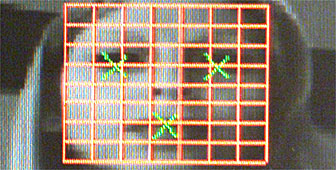Airport asylum seekers face trial by camera

Zurich police have begun filming passengers at the city's airport in a controversial crackdown on illegal immigrants.
The trial scheme – a first in Europe – uses digital cameras to store images of passengers arriving from known immigration hotspots.
Presenting the technology to the media on Thursday, airport police chief Ulrich Neracher said travellers arriving from West Africa would be among the first to be filmed, along with passengers from Arab and Asian states.
“People have been extremely sensitive about the introduction of this technology,” Neracher told swissinfo, “but it’s nothing to get excited about, when you compare it to the close circuit television cameras that are already in common use on our streets and at our train stations.
“Unlike those cameras, the face recognition cameras aren’t watching for random events. They are very specifically targeted at illegal immigrants, so the majority of people really have nothing at all to worry about.”
Privacy rights
Neracher added that a number of measures had been recently introduced in an effort to safeguard privacy rights and satisfy Swiss data protection laws.
Firstly, any passenger who is selected to be photographed can refuse to give his or her consent, although Neracher admitted that such a refusal would likely lead to further questioning and a thorough examination of the passenger’s travel documents.
Secondly, the images of passengers photographed at the airport may only be kept in the police computer files for a maximum of 30 days.
Even then police officers will not be able to sift through the photos since these are instantly encrypted.
It is only when a person applies for asylum in Switzerland without satisfying the police as to his country of origin that the system would come into use.
A further photograph of the asylum seeker would then be taken and put into the computer in the hope of a possible match.
Harmless?
Despite these apparent steps towards protecting the privacy of individuals, not everyone is satisfied as to the harmlessness of the project.
“I’m not completely happy with this trial,” Zurich’s data protection commissioner Bruno Baeriswyl told swissinfo, “mainly because the system itself is not controlled by an independent body, so there is no one impartial to say if the privacy measures are really being enforced or if the technology is working in the way that it should.
“And it’s not just a regular photo we’re talking about. These cameras record the biometric layout of people’s faces, which means they are trying to record unique and personal measurements.
“The resulting digital image is also open to much easier abuse than a regular photograph.
“Beyond that, I’m convinced that the targeting of illegal asylum seekers is just a first step and the ultimate aim is to monitor everybody. We will be told that it’s only to catch drug dealers or terrorists, but it’s everybody’s right to privacy that could suffer.
“After the events of September 11, we constantly have to remind people that individual freedom is a key element of our liberal society and we must always strive to protect that.”
Doubts over accuracy
As well as facing challenges on the grounds of privacy, the Zurich scheme may have to overcome scepticism on the more mundane issue of its accuracy.
During Thursday’s demonstration in front of a large media crowd, the face recognition software failed to match the image of a police officer to a photograph of him taken just seconds before.
Rather than simply drawing a blank, the computer even offered up a picture of an extremely dissimilar-appearing colleague.
A second attempt with a different police officer then proved successful, but left impressions of a software programme that is only 50 per cent accurate at best.
“I think it’s good that happened,” Neracher insisted afterwards, “because we’re not saying that the system is perfect. One of the main aims of the trial is to see just how well it really works.
“What I can say though is that we have already tried out tens of thousands of matches on the computer, and this was only the second time that it didn’t produce the correct result.”
Trial
Having laid out SFr55,000 for the initial technology, Neracher and his team will certainly be hoping that those earlier successes are repeated during the first trial phase, which is set to run until the end of March.
Even if all goes according to the German manufacturer’s handbook, adoption of the face recognition software on a permanent, and possibly, national basis would then still depend on approval by Switzerland’s parliament which is set to discuss the technology later this year, as part of its general discussions on asylum policy.
swissinfo, Mark Ledsom in Zurich
Images of passengers are stored on computer files for a maximum of 30 days.
The system has sparked data protection concerns.
The technology still requires parliamentary approval before it can be introduced.
The trial phase cost SFr55,000 ($39,500).

In compliance with the JTI standards
More: SWI swissinfo.ch certified by the Journalism Trust Initiative











You can find an overview of ongoing debates with our journalists here . Please join us!
If you want to start a conversation about a topic raised in this article or want to report factual errors, email us at english@swissinfo.ch.